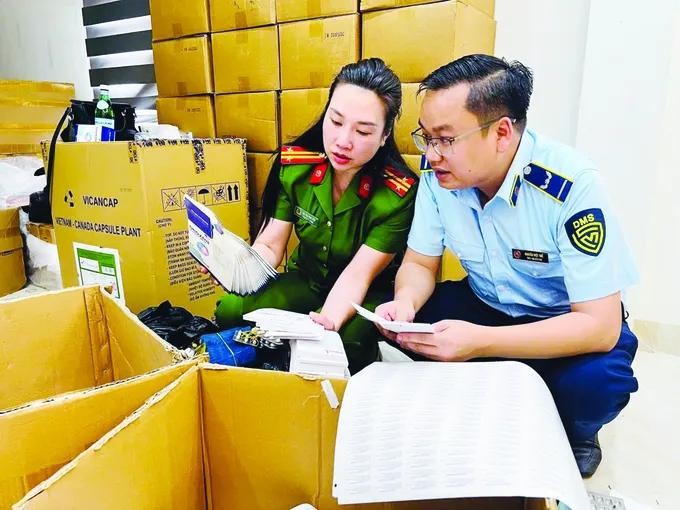Medicine is a vital commodity, intrinsically linked to individuals' wellbeing and mortality. Following the apprehension of numerous perpetrators involved in the manufacture and distribution of fraudulent and inferior pharmaceuticals, the populace has raised inquiries regarding potential regulatory inadequacies.

Recently, the Ministry of Public Security's Investigation Police Agency (C03) prosecuted and temporarily detained Nguyen Thanh Phong, former Director of the Vietnam Food Safety Authority under the Ministry of Health for his involvement in a ring that produced and traded hundreds of tons of counterfeit functional foods.
The investigation agency found that former Director Nguyen Thanh Phong, while still in office, abused his authority to illegally issue numerous GMP-compliant food safety certificates to factories producing counterfeit dietary supplements, including MediPhar and MEDIUSA, key players in a massive fake production network.
Additionally, Phong and his accomplices accepted bribes worth billions of Vietnamese dong to overlook violations during appraisals, post-inspections, and product licensing, enabling and concealing the production and trade of fake dietary supplements, sparking public outrage. Similarly, in 2017, several Ministry of Health officials faced legal consequences for shielding the production and trade of counterfeit cancer drugs.
According to Associate Professor Pham Khanh Phong Lan, who is the Chairwoman of the Ho Chi Minh City Pharmacy Association, the issue of counterfeit drugs has not diminished; rather, it appears to be on the rise, employing sophisticated methods that can easily evade authorities. Counterfeit medications can easily bypass legal regulations and make their way into the market due to the overly simplistic process of issuing drug registration numbers, which primarily relies on documentation rather than rigorous inspections and evaluations at the manufacturing facilities.
Currently, Vietnam boasts over 22,000 drug registration numbers, which is double that of Japan and Singapore, despite having fewer active ingredients. The extensive licensing process and the absence of clear guidance are facilitating the infiltration of counterfeit and substandard drugs into the market.
Disturbed by the persistent issue of counterfeit drugs, functional foods, and substandard medications, National Assembly deputy Pham Van Hoa from Dong Thap Province stated that the Ministry of Health is responsible for ensuring food and drug safety while the Ministry of Industry and Trade oversees combating counterfeit and low-quality goods. Both ministries are tasked with inspections, yet violations have repeatedly occurred, particularly in major cities, which he deemed unacceptable. Therefore, the two ministries are held accountable for the matter.
As stated by Deputy Minister of Health Do Xuan Tuyen, over 43,000 drug samples available in the market were tested for quality assessment in 2024 through the state testing system. The sampling process concentrated on products prone to quality variations, including 500 new pharmaceutical active ingredients and 300 medicinal herbs, resulting in the identification of 228 substandard samples.
Medicine is a unique commodity that is directly linked to human life and health. Any act of manufacturing, trading, or distributing counterfeit drugs, even if it involves just a single pill, constitutes a grave legal offense, a breach of social ethics, and must be condemned and dealt with severely.
Counterfeit drugs have severe consequences, endangering patients' health, eroding trust in the healthcare system, undermining the pharmaceutical industry, and threatening the viability of legitimate businesses. Beyond this, they pose significant legal, ethical, and social repercussions.
Experts note that counterfeit drugs extend beyond fake packaging, with increasingly sophisticated production technology involving advanced printing, fake QR codes, and counterfeit anti-counterfeit packaging, challenging even industry professionals to identify. Meanwhile, the current monitoring and post-control systems remain fragmented, with inadequate inspection capabilities at many facilities.
In addition, legal loopholes further complicate efforts to control counterfeit drugs. While Article 194 of the Penal Code specifies penalties for the production and distribution of counterfeit drugs, the enforcement measures are not sufficiently deterrent. The organized, large-scale, and complex nature of these operations renders detection and identification highly difficult.
According to Associate Professor Pham Khanh Phong Lan, the manufacturing of counterfeit drugs, dietary supplements, or crime with extremely serious consequences'.
Violations in this area are growing increasingly sophisticated, reckless, and prevalent. Alarmingly, perpetrators are fully aware of the harm but continue to act deliberately, prioritizing profit over public health and safety. She expressed concern that the proposed amendments to the Penal Code, which include abolishing the death penalty for eight crimes, such as producing and trading counterfeit medicines and disease prevention products, could weaken deterrence and exacerbate the crime situation.
TPHCM uncovers numerous establishments selling counterfeit medications
According to statistics from the Ho Chi Minh City Department of Health, the city currently has 42 pharmaceutical manufacturing plants; 1,531 wholesale drug and raw material businesses; 8,454 retail pharmacies; and 647 establishments specializing in the retail of herbal medicines and traditional drugs. In 2024, the Department of Health conducted inspections and monitoring of pharmaceutical businesses, discovering 6 establishments selling counterfeit Cefuroxime 500mg and 2 selling counterfeit Cefixime 200mg.
Additionally, based on reports from the public, the Ho Chi Minh City Health Inspectorate inspected and found 1 pharmacy selling counterfeit Neo-Codion. The Department of Health has examined related establishments and compiled a case file to be forwarded to the Ho Chi Minh City Police for further action.
























